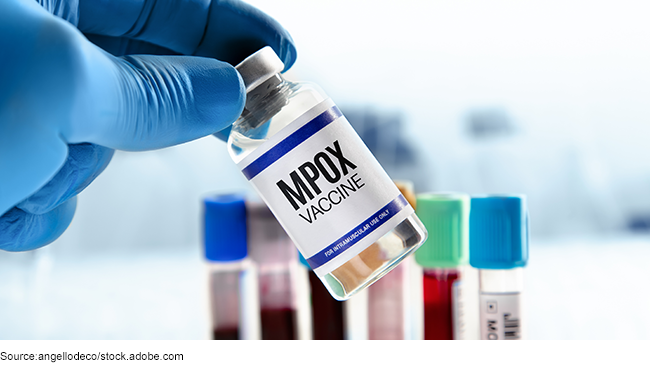Public Health Preparedness: Mpox Response Highlights Need for HHS to Address Recurring Challenges
Fast Facts
Health and Human Services was initially charged with coordinating the federal response to a 2022 global outbreak of mpox—a smallpox-related virus.
State and local jurisdictions cited challenges in the federal response such as difficulty accessing and using vaccines and tests, which may have led to unnecessary suffering. We added HHS's leadership and coordination of public health emergencies to our High Risk List earlier in 2022 due to similar issues in past responses.
We recommended that HHS adopt a coordinated, department-wide program that incorporates input from external stakeholders to identify and resolve challenges.

Highlights
What GAO Found
Mpox, a serious infectious disease caused by a virus in the same family as smallpox, experienced an unprecedented global outbreak in 2022. The Department of Health and Human Services (HHS) led the initial federal response in the U.S., beginning in May 2022. According to a White House press release, a White House mpox response team was established and assumed leadership of the federal response, and the Secretary of Health and Human Services declared mpox a public health emergency in early August 2022. The federal mpox response included providing vaccines to jurisdictions for the prevention of mpox, among other efforts.
Timeline of Selected Mpox Response Activities and Number of Mpox Infectionsa

aThe decline in daily mpox cases was likely due to the combined effect of events in figure above.
The six states, the District of Columbia, and seven local jurisdictions GAO interviewed described challenges with HHS's initial response to mpox that were similar to those GAO identified in HHS's response to past emergencies. For example, jurisdictions noted challenges with communication and the availability of vaccines, tests, and treatments, among other problems. Similar persistent and recurring deficiencies led GAO to add HHS's leadership and coordination of public health emergencies to its High-Risk List in January 2022, calling for an HHS leadership commitment to transform its efforts.
HHS—as the designated lead for the federal public health and medical response to emergencies—does not have a coordinated, department-wide after-action program to identify and resolve recurring emergency response challenges. While some component agencies within HHS have after-action programs, these agencies work independently without coordinating with each other, and do not always engage relevant external stakeholders in identifying challenges and associated solutions. GAO's past work has shown the benefits of coordination and including stakeholders when addressing challenges. Embracing a coordinated, department-wide after-action program for each response that includes external stakeholders would help HHS develop informed and comprehensive solutions. Such solutions should, in turn, strengthen HHS's ability to respond to future emergencies, including those that could be more infectious and lethal than mpox.
Why GAO Did This Study
State and local jurisdictions are often first to detect and respond to public health events. However, if their public health and medical capabilities need support, as with mpox, HHS is charged with coordinating federal assistance to supplement the response.
GAO was asked to review the federal response to the mpox public health emergency. In this report, GAO (1) describes the federal response to the mpox outbreak, (2) assesses the extent to which the federal mpox response presented challenges similar to those experienced in past public health emergencies, and (3) assesses federal efforts to address recurring public health emergency challenges.
GAO reviewed HHS documents and mpox infection data from May 18, 2022, to January 31, 2023. GAO interviewed officials from the Department of Homeland Security, HHS, and 14 selected jurisdictions (six states, the District of Columbia, and seven localities), chosen based on case rates and demographic and geographic diversity. GAO received written responses from the White House mpox response team. GAO also reviewed HHS after-action processes and documents.
Recommendations
GAO is making two recommendations to HHS: to develop and implement a coordinated, department-wide after-action program that (1) encourages after-action collaboration across HHS component agencies, and (2) includes relevant external stakeholders involved in each response when identifying challenges and associated solutions. HHS concurred with both recommendations.
Recommendations for Executive Action
| Agency Affected | Recommendation | Status |
|---|---|---|
| Department of Health and Human Services | The Secretary of Health and Human Services should develop and implement a coordinated, department-wide after-action program that encourages collaboration between HHS's component agencies, including integrating the existing public health emergency after-action programs of these component agencies. (Recommendation 1) |
As of October 2024, we have not received an update from HHS on actions taken to address this recommendation. When we confirm what action the agency has taken in response to this recommendation, we will provide updated information.
|
| Department of Health and Human Services | The Secretary of Health and Human Services should develop and implement a coordinated, department-wide after-action program that includes relevant external stakeholders involved in each public health emergency response—such as other federal agencies, jurisdictions, and nongovernmental partners—when identifying challenges and associated solutions. (Recommendation 2) |
As of October 2024, we have not received an update from HHS on actions taken to address this recommendation. When we confirm what action the agency has taken in response to this recommendation, we will provide updated information.
|
